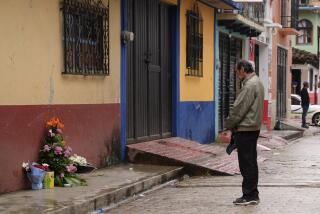Chiapas Bishop Ends Fast After Officials OK Talks : Protest: Some credit Samuel Ruiz with preventing further fighting, but others blame him for inciting a peasant uprising.
- Share via
SAN CRISTOBAL DE LAS CASAS, Mexico — Encouraged by what he called “signs of hope,” Roman Catholic Bishop Samuel Ruiz called off his 15-day fast this week after the Mexican government agreed to negotiate with the rebel Zapatista Army that is waging war in the Mexican state of Chiapas.
The peasant uprising began a year ago--on New Year’s Day, 1994--when the rebel Zapatista Army of National Liberation declared war on the Mexican government, seeking political revolution, land reform and broader human rights.
Since then, Ruiz has served as a mediator between the two sides, holding peace talks in the cathedral of this city, Chiapas’ capital.
On Tuesday--surrounded by eight others who were fasting, their faces gaunt and their clothes hanging loosely--Ruiz told a packed Mass at the cathedral that he was encouraged by the government’s willingness to call a truce, but that Chiapas remains at risk.
“The dynamic of war has changed, but not completely,” Ruiz said, his voice cracking. “Chiapas remains a barracks. . . . We need to create a broader and more enduring truce.”
If peace does come to Chiapas, it may well be through the efforts of Ruiz, a 70-year-old bishop who has spent more than three decades ministering to the largely Indian population in Mexico’s poorest state with social activism that has made waves in the Vatican and created enemies among local ranchers and politicians.
In recent days, Ruiz’s fast, which he began Dec. 20 after the rebel army occupied towns and blocked forces through the state’s highlands, probably prevented a new round of fighting between the rebels and government forces, said Andres Aubry, a San Cristobal historian and anthropologist.
“We were on the brink--a question of hours--of an imminent ethnocidal war in Chiapas and in the country,” Ruiz wrote in a pastoral letter. “The right religious gesture was a fast: as a penitence and purification, as a protest against the hunger of our brothers, as a prayer to God to purify our hearts, as an instrument in the struggle against evil.”
Throughout Mexico and the world, hundreds joined Ruiz in fasting and prayer. For more than two weeks, the bishop sat in the cathedral beneath a small altar with statues of two angels, a painting of the Virgin Mary and a cross.
*
When Ruiz broke his fast after both sides agreed to talks, many in Mexico felt their prayers had been answered and compared Ruiz to Gandhi. He is the only man in the country, many say, with the moral stature to unite Mexico in times of crisis.
But others blame him and his social activism for inciting the peasant uprising. Antonio Gomez Perez, a Tzotzil-speaking Indian from the mountains outside San Cristobal, said the church’s teaching inspired the Zapatista rebels to take up arms.
“Those people who rose up are with the bishop,” he said, referring to Zapatista supporters who blocked a road in his town for three days in late December. “I’m Catholic myself and it gives me great pain to say the bishop is dividing the people.”
Conservative landowners and local politicians in Chiapas have nicknamed Ruiz the “Red Bishop,” suggesting he is a communist.
Ruiz says he has received too many death threats to count, and in the last year his picture has appeared on wanted posters throughout San Cristobal. In 1993, Papal Nuncio Giralamo Prigione launched a campaign to force Ruiz to step down over charges of mismanaging the San Cristobal Diocese.
Ruiz’s liberation theology-inspired defense of the poor--in a state where they often face violent repression--has led the church into numerous conflicts with state and federal authorities. And there is little doubt that the church’s pastoral organization helped form the base for the Zapatista rebels.
But Ruiz has made it clear that although he understands the impulse that led the Zapatistas to take up arms, he continues to believe in nonviolent solutions to the problems of Chiapas’ Indians.
The rebel fighters “couldn’t take the suffering any longer,” he preached to a group of several thousand Indian peasants last year. “We can stand a little bit more.”
More to Read
Sign up for Essential California
The most important California stories and recommendations in your inbox every morning.
You may occasionally receive promotional content from the Los Angeles Times.













